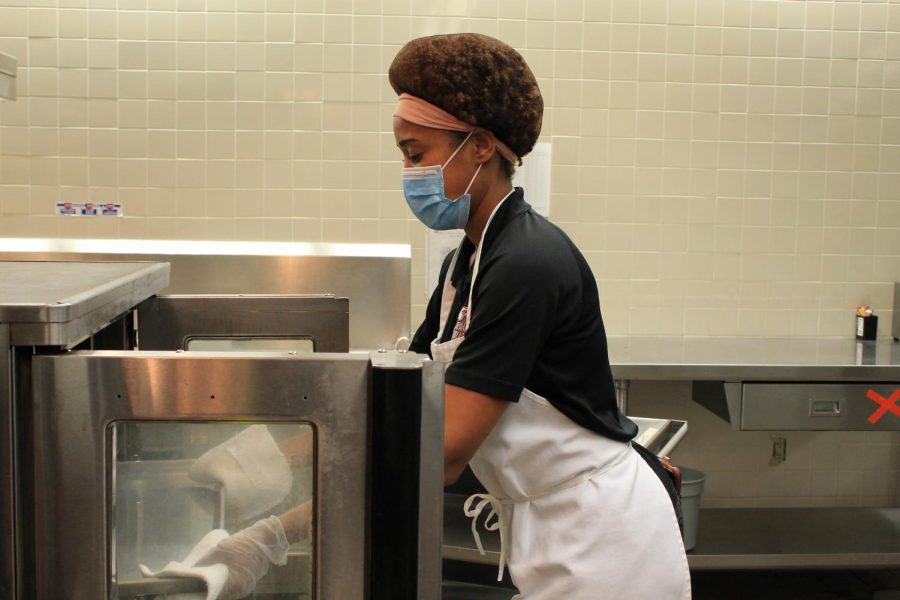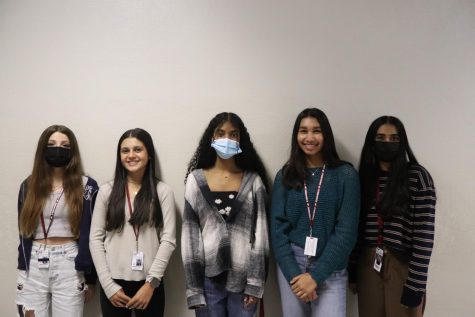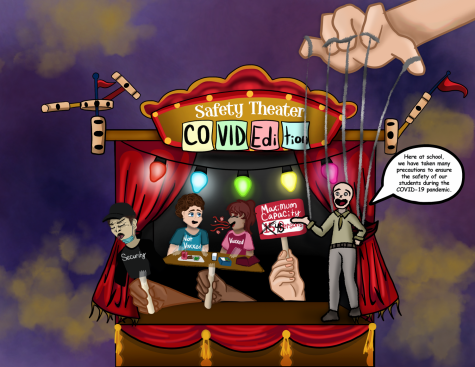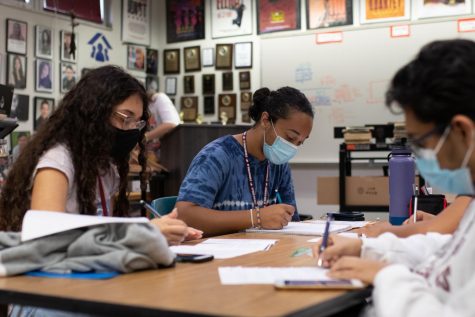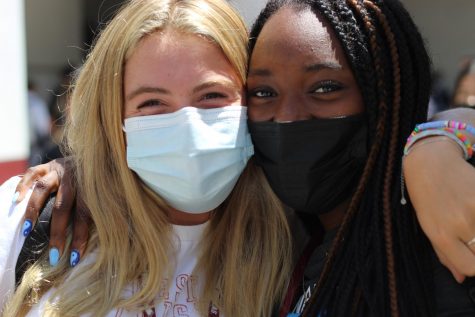MSD employees believe the current minimum wage is not enough to support families in today’s industrial society
Maria Smith, a food service cook at MSD, supports an increase in minimum wage. The ongoing COVID-19 pandemic has affected numerous aspects of her life, such as her opportunities and living situation. Photo by Rayne Welser
May 24, 2021
Unable to pay the bills on time or buy food for their families, individuals making the minimum wage have faced many struggles in their lifetime. According to the United States Department of Labor, Florida’s basic minimum rate is $8.65 per hour. Factoring in basic necessities, like clothing, and annual payments, like housing, the minimum wage often cannot address all the expenses of survival.
At Marjory Stoneman Douglas High School, making the minimum has impacted family life, health and happiness. With everything having a price, making ends meet to barely scrape by cannot be considered luxurious circumstances.
“I believe that the minimum wage is way too low, especially with the cost of living in the area that we live in and everything,” facilities serviceperson Christopher DeBerry said. “I’m making just a few dollars over $10 an hour.”
Seen in many cases, individuals not making much in one job often have to work several to support themselves, their spouse and their children. In larger families especially, more mouths to feed makes life harder for those bringing home a salary. Not every need can be fulfilled, and that understanding is not always favorable.
“My opinion on minimum wage is that the amount has not kept up with inflation like it was intended,” Food and Nutrition Services Manager Krystle Connell said. “The amount is not nearly enough for families to adequately provide for everyday expenses, this means people work multiple jobs to make up for the low pay rate. Families suffer hardships because of this.”
Numerous disadvantages come with the minimum wage, affecting parents and children the most. When families can barely stay afloat, activities such as sports and vacations are not an option.
Moreover, those who have immigrated to the U.S. have faced a cultural reset and a new world. Without knowledge of the English language nor any favorable connections to help them succeed, immigrants are known to start from the bottom and work their way up.
“I made a sacrifice coming from a different country,” food service worker Neeralah Ramsahai said. “I really work with what I have, but now it’s difficult. I did it for my country, Trinidad and Tobago, and for my two kids who went to college.”
At MSD, the cafeteria and janitorial staff make above the minimum wage, but the least amount speaking in general terms. For the food services department, employees get free meals as kitchen staff and participate in raffles at monthly meetings. Additionally, since their staff primarily come in at a lower starting pay bracket, individuals gradually earn a higher wage through training and job title changes.
“Food service is not always glamorous, but even with that, I am proud that I started from the bottom and worked my way to management,” Connell said. “The pay is not why we do this job, we do this because we love working with kids.”
With the introduction of the COVID-19 pandemic in March 2020, the onslaught of concerns and problems have arisen on an international scale due to increases in unemployment, safety regulations and virtual learning.
“I have a couple of kids that are not well enough to be out so [the pandemic] affected me a lot,” food service cook Maria Smith said. “I’ve missed a lot of work days because of it and I can’t even qualify for promotion because I missed so many days.”
Living costs skyrocketed during this time as more people stayed home and used their electronics for work. If the minimum wage is increased to $15 per hour, which has been in talks for months now, the standard of living would drastically improve. Conversely, prices are expected to increase with the rate of inflation.
“[COVID-19 has] made everything cost more now between having to worry about personal protective equipment for my family and my children being home for that period of time when school was not open,” DeBerry said.
Making the minimum wage has also stirred questions about whether leaving for a job that makes more money is the way to go. From moving counties to handling a side hustle, adults are constantly thinking about the best options for their well-being.
“[Getting a better job] would require me going back to school, which would also cost more money, and I would still have to work so it would be adding another additional job versus quitting this job, or just finding a job that pays more per hour,” DeBerry said.
While making the minimum wage is unconventional and unrealistic for many living conditions, people have to adapt and deal with the different outcomes.
“[Minimum wage] was an adjustment from my previous employment where I made a much higher salary,” Secretary II Debra Wanamaker said. “I bring lunch from home to save on food/take out expenses. I must be choosy on what activities I can participate in with my coworkers to stay within my means.”
Despite not making what doctors or lawyers make, MSD employees have found the benefits within their occupations. Their mentalities and long-term goals keep them in the education system.
“I always wanted to work in a school,” school counselor Rachel Kusher said. “When I discovered school counseling, it was just the perfect fit for me so no, I have never really considered leaving due to financial reasons.”
Nonetheless, Americans now are discussing backing a $15 an hour minimum wage. As stated by a 2019 Pew Research Center survey, 67% of U.S. citizens support raising the minimum wage. By doubling the current minimum of $7.25 to $15, individuals will have more resources to provide for themselves as well as their families.

